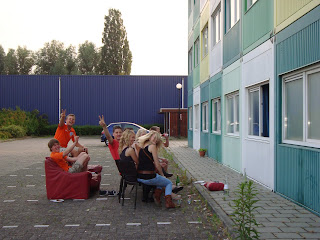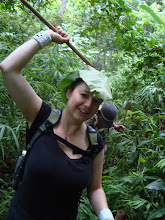I escaped the snow and ice of the Netherlands just in time. Instead of freezing my balls off, I have been enjoying the much milder climate of Morocco. It isn’t as warm as I imagined it to be, the temperature hasn’t been over 25 degrees, but it’s still pretty nice.
I spent most of my time with Tarik’s lovely family in Agadir and Marrakesh, but I also squeezed in a little travelling. I will give you a quick tour of Morocco through all the little creatures I encountered.

The Scorpion
In my third week in Morocco me, Tarik, Tarik’s father, Aziz, and Tarik’s brother, Younes, went to Tanalt in the Anti Atlas. The family owns a house and a lot of land there. The house is enormous, it must have at least thirty rooms, and beautiful in a picturesque sort of way, but it is also really basic, it has, for example, no electricity and no shower. Tanalt is not a place where tourists normally come. There are no hotels or restaurants, and the locals do not speak English or French, or even Arabic, they speak Berber.
Tarik’s father warned me to watch out for snakes and scorpions, as they might be hidden under a stone and bite you all of a sudden. We were climbing the mountain in front of the house, which is also owned by the family. Aziz was looking for minerals on our way to the top, so he brought a hammer with him and cracked open more than a few stones. On the top of the mountain we found the remains of a house and things allegedly left behind by druids and sorcerers. Apparently the mountain is holy and every year the druids and sorcerers come together on the top of the mountain for a special celebration.
On our way down Aziz spotted the scorpion. To be honest, it was really tiny and didn’t look very dangerous. A few minutes later I almost stepped on a snake, but it ducked under a stone before I realized it, so, I had no time to take a picture or panic.


Donkeys and Mules
This specific mule took me from the house where Tarik and I stayed for a couple of days to the house of a family Tarik knows and where we had tea. We were staying with friends of Tarik’s father; their house is in the middle of nowhere, 44 kilometers north of Essaouira. The plan was to work on their land for a week, as a sort of improvised wwoof-project. The family, however, couldn’t quite grasp this plan of ours. To them we were their guests, and didn’t need to work the land. We were welcome to stay in their humble house and do whatever we wanted. They even gave us our own room (they only had a living room, kitchen en two bedrooms for six people) and prepared special food for us, while they ate something else in the kitchen. This was not what we expected or wanted, but it was difficult to refuse all their hospitality, as that might seem ungrateful for all they were doing for us. We did work on the land a little. They were growing garden peas and we helped weeding, but without instructions or proper tools there wasn’t much else we could do. In the end, we only stayed for four days, and spent our last day on the beach close by.
But to come back to the mule, I was hoisted on top of it and rode it for forty minutes straight. I have always liked donkeys and mules and thought they were really sweet. Turned out they can be quite nasty! This mule only let me ride him because his owner was walking right next to me the whole time. Had he gone, the mule wouldn’t have been so docile and would have kicked the life out of me!
I see mules and donkeys every day here in Morocco. They are a way of transport for poor people in the city or people in the countryside. They are beasts of burden and carry leather to the tanneries through the narrow streets of Fes or branches to a farm in Azrou. And you see many mules and donkeys, often together with a horse or a camel, pulling a plough.


Turtles and tortoises
The donkey wasn’t the only animal I encountered during my semi-wwoof experience; ever so often while I was weeding a tortoise would crawl past. By the way, they aren’t as slow as you expect them to be. Many a wild tortoise lives happily in the fields and shrubs of this area.
A few weeks later, during a walk from lake Dayet Aoua to lake Sidi Mimoen, I spotted two turtles in the water. Ok, to be fair, Tarik spotted them, but I managed to take some pics before they jumped in the water. We had been lured to do the “Lake Circuit” by promises of beautiful scenery, tranquility and plenty of birdlife. After all, the lakes are in the middle of the National Park of Ifrane. Unfortunately, the real experience was nothing of the sort. Lake Dayet Aoua is surrounded by a road, which, instead of birds, attracts Moroccan families on a day out.
After Dayet Aoua we walked, next to a road, to lake Sidi Mimoen. This lake was smaller, and prettier. It was off the main road, and not accessible by car. We still didn’t see any birds, but had a lovely picnic there all the same. When we were on our way back, we saw the turtles, sitting on a rock in the water and enjoying the sun.


Storks
I never knew there were so many storks in Morocco! The first time I spotted one I got really excited and took at least fifteen pictures, thinking this was a rare opportunity to do so. I was walking in Marrakesh to the Palais el-Badi, a now ruined palace, when all of a sudden a stork flew past. I felt wonderfully content when I had taken those, not very sharp, snaps, until I reached the walls of the old Kasbah and spotted many stork families and empty nests on top of it.
Since then I have seen storks almost everywhere I went. They have built nests on the craziest locations. I have seen storks and stork nests on houses, minarets, electricity poles, street lights, chimneys, and even on top of the columns at the roman ruins of Volubilis.
I guess the storks also wanted to escape the cold weather and spent some much needed holiday-time in Morocco.


Snakes
Apart from that one snake I saw in Tanalt, I haven’t seen any snakes in the wild. I heard a lot of scary stories about snakes in Morocco though, enough to make me check every inch of earth before I sit down anywhere in rural Morocco.
The only other snakes I saw were at the Djemaa el-Fna in Marrakesh. Djemaa el-Fna is the famous square you always see in movies, it’s even on the Unesco World Heritage list. I have always thought that the snakes, especially cobras, would be waiting in a round straw basket. Then, when a guy would play some sort of special melody on a flute, the snake would come out, hypnotized. It wouldn’t be able to bite you, as it was so mesmerized by the sound of the music. It turned out that my idea was, as always, way too romantic. There are snakes, but they are just lying around on a rug. The guys play the flute, that part was right, but the snakes aren’t mesmerized in the slightest. In fact, when I asked one of the guys why he was playing the music, he responded “for the tourists”! Disillusioned I took some pictures.


Fleas
I have fleas. I think. I have been scratching myself all over for two weeks now. In Essaouira only my back itched a little, but by the time I was in Marrakesh I had a rash all over my back and stomach. Little by little the rash spread all over my body. Right now everything is itchy and red, except my head. I am not sure it is caused by fleas; it could also be an allergic reaction to food, soap or some other exotic substance. But I am a little suspicious, because the spots on my body look like tiny bites, and because they are increasing over time. I mean, I have had this rash for two weeks now, that’s a bit long for an allergic reaction to food, right?
I tried to find information online about human fleas, but because they do not exist in Europe anymore, I found almost nothing. One of the few websites on human fleas mentioned that a hot bath with lemon juice and washing liquid helps to kill fleas and their eggs. So, in Meknes I lied for a full half hour in a steaming bath tub surrounded by bubbles and bobbing lemon slices. I don’t think it helped much.
Did I mention that Tarik is perfectly fine? Apparently, fleas pick favourites. Just my luck I am one tasty chicken….


Monkeys
Right now I am in a little mountain village called Azrou. It’s quite cold today, and will be for the rest of the week, so, I am heading south tomorrow. But yesterday the weather was lovely, and I went to the forest around Cèdre Gouraud, the tallest tree of North Africa. I hiked for four hours and didn’t see a soul, apart from the first ten minutes. It is dangerous to make generalizations, but so far it seems to me that Moroccans do not like hiking. They like nature, but prefer to watch it in their cars. If they do step out of their beloved vehicle, it is to have a picnic or to take a quick look (and some pictures).Bless them, for it improves a hike immensely if there are no other people around.
The forest does not only boast the giant tree, it is also a famous place to see Barbary apes. Because people feed the monkeys bananas, biscuits and nuts, there are plenty of apes roaming about the outskirt of the forest. That’s quite special, because the Barbary ape is normally really shy. Two funny facts about Barbary apes: first that the Barbary ape is not an ape, but a monkey, and second that their group hierarchy is determined by an alpha female, instead of the usual alpha male (the lonely planet informs me).
The monkeys were really cute, although it was a bit of a turndown that they weren’t the least interested in the nuts I had bought for them. I also saw two baby monkeys; they raced each other in a tree. But as soon as I went deeper into the forest, the monkeys didn’t show themselves anymore. Not even when I temptingly held out some nuts…..
Now I am heading south, so the next “little creature” I’ll get to know up close and personal will surely be the camel!
Bssssslema!
Jonna






















